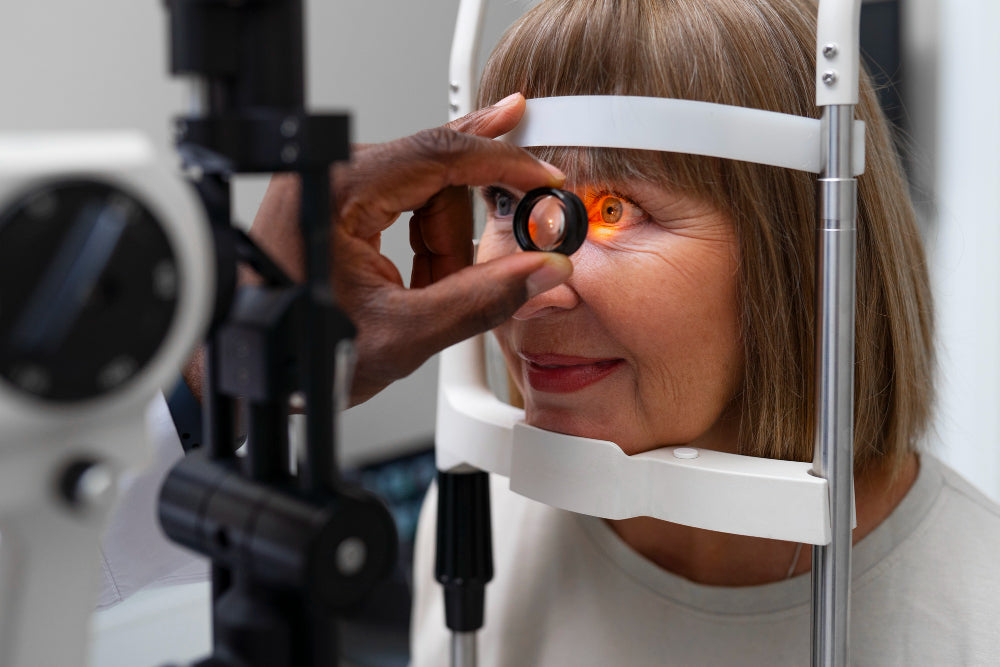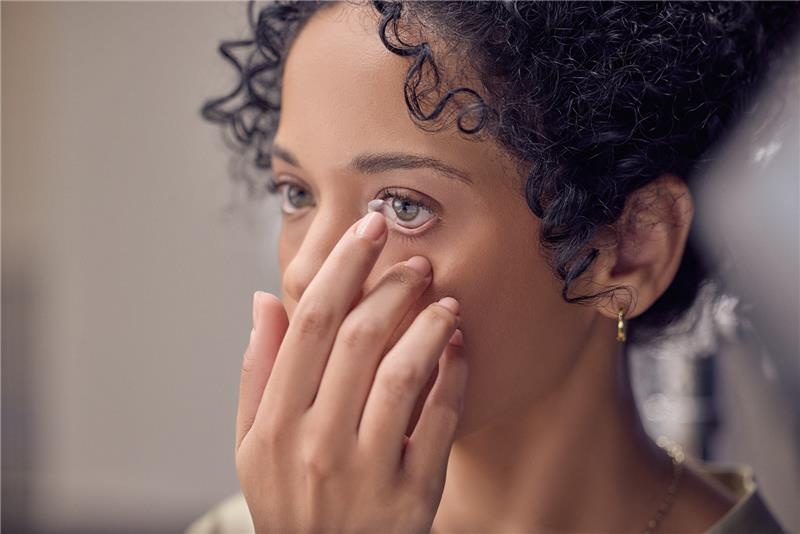Have you ever felt the room spin unexpectedly, even when standing still? Most of us have experienced that sensation at some point. While dizziness is often blamed on dehydration or inner ear issues, your eyes may be the culprit.
Yes, vision problems can cause dizziness — and the connection is more common than you think. So, let's shed some light on the common concern. Can vision problems cause dizziness? The straight answer is yes, as said earlier. Vision problems can cause dizziness, especially if your eyes struggle to focus or coordinate properly.
In this post, we'll explain how vision-related issues can lead to dizziness, explore key symptoms, and share actionable solutions to help you regain control. Read on to learn more!
Understanding the Basics: What Is Dizziness?
Dizziness is a broad term encompassing a range of sensations — feeling faint, woozy, unsteady, or as if the surroundings are spinning. It affects millions of people every year.
In fact, according to the National Institutes of Health (NIH) statistics, about 15% to 20% of adults experience dizziness or balance-related issues at some point each year, making it one of the most common complaints in medical clinics.
Dizziness generally falls into two main categories:
-
Lightheadedness is a sensation of almost fainting or feeling like you might pass out. It's often caused by factors like low blood pressure, dehydration, anemia, or sudden changes in position (known as orthostatic hypotension). People may describe it as feeling "floaty" or disconnected.
-
Vertigo: Vertigo is a more intense and specific type of dizziness defined by a false sense that you or your surroundings are spinning. It is usually linked to inner ear problems, including benign paroxysmal positional vertigo (BPPV), vestibular neuritis, or Ménière's disease. Vertigo can be disorienting and may be accompanied by nausea or balance loss.
How Vision Impacts Balance

Approximately 5% of children in the United States, equivalent to around 3.3 million kids, have experienced dizziness or balance issues within the past 2 years, according to national health surveys.
Balance isn't controlled by a single organ; it's a complex, integrated system involving your eyes (visual system), inner ears (vestibular system), muscles and joints (proprioception), and brain. Among these, vision plays a critical and often underestimated role.
Your eyes continuously send information to your brain about where you are in space, helping you remain oriented and upright. This communication happens largely through the vestibular reflex (VOR), which stabilizes your vision while your head moves.
Here are the key ways your vision contributes to your sense of balance:
-
Depth Perception: This lets you precisely judge distances between objects and yourself. Poor depth perception can make navigating stairs or uneven surfaces risky and destabilizing.
-
Peripheral Vision: Your side vision helps you stay aware of your environment, such as moving people or objects, without turning your head. A reduced peripheral field can throw off your spatial awareness due to conditions like glaucoma, which can cause tunnel vision.
-
Focus and Eye Tracking: Smoothly shifting focus from one object to another helps your brain process motion and adjust your body accordingly. People with eye alignment or convergence problems may experience dizziness when reading or moving quickly.
According to research published in the Journal of Vestibular Research, visual dysfunction contributes to nearly 25% of patients with chronic dizziness. Moreover, individuals with both vestibular and visual impairments are twice as likely to suffer falls, particularly older adults.
Dizziness can have many underlying causes, but understanding its types and the crucial role of your vision in maintaining balance can help you identify when something isn't right.
Caution: If you're experiencing frequent dizziness, blurry vision, or unsteadiness, it's essential to seek a comprehensive evaluation. Both eye tests and vestibular assessments can offer critical insights and prevent potential injuries or falls.
The Vision-Dizziness Connection: Key Eye Condition
Bad eyesight can cause dizziness. The eye conditions that are associated with dizziness are as follows:
1. Binocular Vision Dysfunction (BVD)
This condition occurs when your eyes are slightly misaligned, making it difficult for your brain to merge the two images. This misalignment can strain your eye muscles and trigger symptoms like:
-
Dizziness and balance issues.
-
Headaches, especially after reading.
-
Double vision or trouble focusing.
Studies state that many individuals may experience some level of binocular vision dysfunction, though the condition is often undiagnosed.
Solution: Prism glasses are often prescribed to correct the misalignment. Specifically, Neurolens is a particularly effective method to assist with underdiagnosed misalignments of the eyes on computers and while driving. Vision Source Rio specializes in Neurolens prescription glasses. Book an appointment for this assessment.
2. Eye Strain and Digital Eye Fatigue
Prolonged screen use forces your eyes to focus intensely, leading to overexertion. Symptoms include:
-
Dizziness after long hours on a computer.
-
Blurred vision.
-
Neck and shoulder tension.
Solution: Practice the 20-20-20 rule (look at something 20 feet away for about 20 seconds every 20 minutes) and consider blue light-blocking glasses.
Look into Neurolens to ease digital eye strain. Schedule an appointment.
3. Uncorrected Refractive Errors
Vision problems like nearsightedness, farsightedness, or astigmatism can strain your eye muscles, particularly if left untreated. This strain can result in:
-
Dizziness and nausea.
-
Squinting and headaches.
Solution: Regular eye exams and the correct prescription lenses can resolve these issues quickly.
4. Sudden Inability to Focus + Dizziness
Sometimes, dizziness paired with sudden vision changes can signal a serious medical issue, such as:
-
Migraine-related dizziness (ocular migraines).
-
Stroke or brain injury.
-
Diabetic retinopathy or glaucoma.
Red Flags: Seek immediate medical help if you notice these symptoms along with dizziness:
-
Slurred speech.
-
Numbness or weakness on one side of the body.
-
Severe headache.
5. Vertigo-Related Eye Issues
Conditions such as benign paroxysmal positional vertigo (BPPV) and nystagmus (involuntary eye movements) interfere with how the brain interprets balance and motion signals. These disruptions can lead to:
-
Spinning sensations or vertigo.
-
Difficulty focusing or tracking objects.
-
Visual disturbances that worsen with head movement.
Solution: Vestibular therapy is often effective for BPPV, helping retrain balance pathways. For nystagmus, treatment focuses on managing the underlying cause, which may include neurological care or vision therapy.
6. Vestibular Ocular Disorders
Some vision problems stem directly from imbalances in the inner ear. Conditions like vestibular neuritis or labyrinthitis disrupt the connection between the eyes and the vestibular system, which is responsible for stabilizing vision during head movement. When this system is impaired, symptoms may include:
-
Spinning sensations (vertigo).
-
Visual instability when moving or turning the head.
-
Difficulty focusing, especially while walking or reading.
Solution: Vestibular rehabilitation therapy (VRT) can help retrain the brain to interpret balance signals correctly. A specialist may also recommend anti-inflammatory medications if the condition is caused by infection or inflammation.
7. Cataracts or Blurred Vision from Eye Disease
Age-related eye conditions like cataracts, glaucoma, or macular degeneration cloud or distort the visual field. When your brain receives incomplete or blurry visual input, it struggles to maintain orientation, especially in low-light settings or crowded environments. This can lead to:
-
Dizziness or disorientation in dim lighting.
-
Increased risk of tripping or falling.
-
General imbalance due to reduced visual clarity.
Solution: Timely diagnosis and treatment such as cataract surgery or medications for glaucoma can restore clearer vision and reduce dizziness. Regular eye exams are essential, especially after age 60.
Secondary Symptoms: Headaches, Blurred Vision, and More

Can Bad Eyesight Cause Headaches and Dizziness?
Eye strain from uncorrected vision problems forces your brain and eye muscles to work overtime, leading to:
-
Pain around the temples or forehead.
-
A sensation of pressure behind the eyes.
-
Nausea or discomfort when reading or focusing for long periods.
Blurred Vision and Dizziness: Common Culprits
Blurred vision can be a direct cause of dizziness, mainly when caused by:
-
Low blood sugar or dehydration.
-
Eye diseases like cataracts or macular degeneration.
-
Medication side effects (e.g., antihistamines).
-
High Blood Pressure
If you're experiencing persistent blurred vision and dizziness, consult an optometrist to rule out underlying issues.
Diagnosis: How Eye Doctors Identify the Issue
When you visit an eye doctor for dizziness-related concerns, you may undergo the following tests:
-
Visual acuity and refraction to check for refractive errors.
-
Cover test to assess binocular vision dysfunction.
-
Retinal exam to rule out diabetic retinopathy, hypertension and glaucoma.
-
Vestibular-ocular reflex testing to evaluate balance-related eye issues.
Important: If your symptoms point to deeper neurological issues, you may be referred to a neurologist for advanced testing.
Treatment Options for Vision-Related Dizziness
Corrective Lenses & Prism Glasses
For individuals with Binocular Vision Dysfunction (BVD) or eye misalignment, prism glasses are often prescribed. These specially designed lenses subtly bend light to help align the images each eye sees, reducing eye strain, double vision, and the dizziness that results from visual imbalance. Standard corrective lenses also play a vital role in resolving uncorrected refractive errors like myopia or astigmatism. Neurolens can be prescribed for people who need contoured prism correction.
Vision Therapy
Personalized vision therapy programs can effectively treat many functional vision issues. These involve structured eye exercises, often guided by an optometrist to strengthen the eye muscles, enhance coordination between both eyes, and retrain the brain to process visual information more accurately. Conditions like convergence insufficiency, accommodative dysfunction, or divergence excess may significantly improve with consistent therapy.
Surgical Solutions
When visual misalignment is caused by structural problems, such as strabismus (crossed eyes) or muscle paralysis, eye muscle surgery may be necessary. These procedures realign the eyes by adjusting muscle length or position, providing long-term relief for patients with severe symptoms that don’t respond to non-invasive treatments. Patients considering eye muscle surgery should never do so without a cycloplegic, or “wet” refraction, as latent hyperopia (hidden farsightedness) can cause eyes to turn but is easily corrected with glasses as opposed to surgery.
Lifestyle Adjustments Or Preventive Measures
Simple daily habits can greatly reduce symptoms and prevent flare-ups. Follow these tried and tested tips for managing dizziness day-to-day:
-
Screen Time Management: Install blue light filters on digital devices, dim screen brightness in the evening, and limit device use before bedtime. Take frequent visual breaks to reduce digital eye fatigue.
-
Use the 20-20-20 rule: every 20 minutes, look at something 20 feet away for 20 seconds.
-
Optimize your workspace with ergonomic seating, proper monitor height, and anti-glare lighting.
-
Stay hydrated, manage stress, and consume a diet rich in eye-supportive nutrients like omega-3 fatty acids (found in fatty fish), lutein and zeaxanthin (found in eggs) and vitamin A (from meat, eggs, and dairy).
-
Annual Eye Exams: Even if you have no obvious vision problems, regular checkups help detect silent issues early — especially important for aging adults and children.
-
Other Healthy Habits: Aside from maintaining a nutrient-rich diet, exercise regularly to improve blood circulation to the eyes and brain, and avoid smoking, which increases the risk of age-related eye disease and poor circulation.
Proactive care is essential to avoid long-term vision problems.
Case Studies/Real-Life Examples
Case 1: The Office Worker
Jane, a 34-year-old graphic designer, experienced daily dizziness and headaches after long hours at her computer. Diagnosis revealed digital eye strain. After implementing the 20-20-20 rule and wearing Eyezen lenses, her symptoms improved within weeks.
Case 2: The Senior Citizen
Tom, a 67-year-old retiree, struggled with dizziness and unsteady balance. His optometrist diagnosed binocular vision dysfunction, and Neurolens provided immediate relief.
Frequently Asked Questions
Can dizziness from vision problems be permanent?
While it can, most cases improve with proper diagnosis and treatment.
How long does it take for Neurolens to work?
Many patients notice improvements within days, though full adjustment may sometimes take a few weeks.
Is dizziness a sign of needing a new glasses prescription?
It can be, especially if your symptoms worsen during reading or screen use tasks.
Can eye strain cause dizziness and balance issues?
Yes, prolonged eye strain can lead to dizziness, especially when focusing on screens or reading for extended periods.
Do children experience dizziness from vision issues?
Yes, uncorrected vision problems in children can lead to dizziness, especially during school or physical activity.
Are older adults more prone to dizziness from vision problems?
They can be, as age-related vision changes can affect depth perception and balance, leading to dizziness.
Can blue light from screens contribute to dizziness?
Yes, overexposure to blue light can cause digital eye strain, leading to symptoms like dizziness or headaches.
The Bottom Line

You learned how vision problems like blurry eyesight, eye strain, and binocular vision dysfunction can trigger dizziness, headaches, and balance issues. We also discussed symptoms, treatments, and expert tips to fix the problem.
Dizziness can be frustrating and even debilitating. But understanding the link between your vision and balance is the first step toward relief and a happy life. If you're experiencing persistent dizziness, headaches, or blurred vision, don't wait — schedule an eye exam today to uncover the root cause and start feeling like yourself again!





